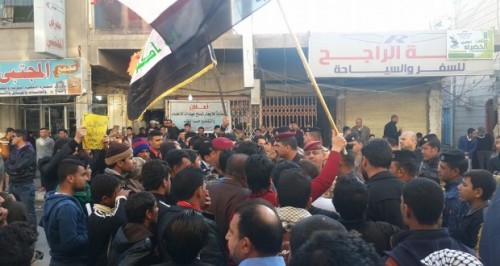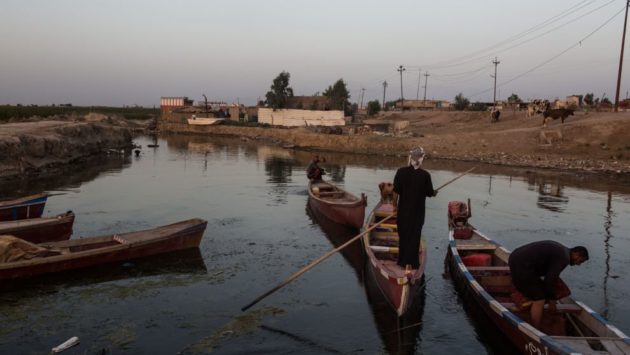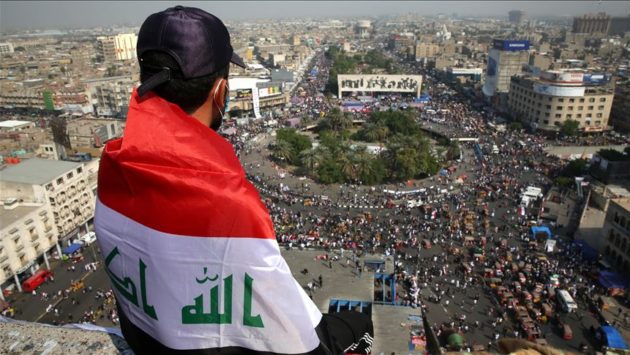Ministries Without Quotas’: New Campaign Against Sectarian Politics
Niqash : Mustafa Habib
As levels of violence increase in Iraq’s north, a new campaign in Baghdad provides some positive news. Around 70 activists have launched the campaign, Ministries Without Quotas, in an attempt to overcome sectarian and ethnic politics.
Just a few days before the deadline for Iraq to form its new government, around 70 civil society activists met in Baghdad. They announced an initiative – the first of its kind – that will oppose the sectarian quota system often used in Iraqi politics.
Although it has never been written into Iraqi law, this system was created by US administrators as they set up the country’s new government after a US-led invasion that toppled the regime of Iraqi leader, Saddam Hussein. In order to avoid sectarian infighting among politicians, the US administrators, led by Paul Bremer, thought it best to split the most important positions in Iraq’s new Parliament between the three major ethnic and sectarian groups in the country; that is, the Sunni Muslims, Shiite Muslims and Iraqi Kurdish. Over time though, many analysts believe this practice has come to hamper Iraqi democracy, with leaders being picked for their sect or ethnicity, rather than on merit.
This is why the civil society campaigners were gathered in Baghdad. To highlight this problem, they proposed that four ministerial portfolios in Iraq’s next government be granted on the basis of merit and ability, rather than sectarian or ethnic components. They wanted independent MPs or technocrats to head the ministries of education, higher education, culture and sports; and they were calling their campaign, Ministries Without Quotas.
“Ministries have been mismanaged because of the quota system,” explains civil society activist Ahmed al-Rawi. “The positions are given out randomly to people who don’t have any expertise in the field. We want important posts to be held by those who know what they are doing and who are competent.”
Some politicians have already attacked us for the campaign,” al-Rawi told NIQASH. “They say we want the jobs for ourselves. But what we really want is that these ministries be administered by independent individuals with experience in the job.”
The activists noted that a lot of ministers and senior officials only got their jobs because they said they were opposed to the former regime of Saddam Hussein. They also consider that they have the right to hold these positions, despite the fact that their education didn’t go much beyond religious studies.
MP Shorouq al-Abeji, a member of the coalition of civil society-minded, secular parties known as the Civil Democratic Alliance, explained why the activists had chosen to target these ministries with their campaign.
“They have much to do with the development of our society,” al-Abeji told NIQASH. “The ministries of education and higher education are responsible for young Iraqis until they are 20 years old. They are the ministries that create awareness in society.”
“And the culture ministry should be in the hands of people from cultural circles because they can understand the needs of this sector best,” she noted. “The same thing applies to the ministry of sports, which is responsible for the physical health of the Iraqi people and plays an important part in developing the mental health of a new generation.”
Somewhat ironically the current Minister of Culture is also the acting Minister of Defence, Saadoun al-Dulaimi. Many of those in the culture sector say al-Dulaimi has no interest in culture, is too busy and is actually running the culture ministry from the premises of the Ministry of Defence.
Meanwhile Jassim Mohammed Jaafar, Iraq’s Minister of Youth and Sports, has come in for criticism from the country’s athletes because he usually uses sports events to deliver political messages and criticise other nations. He’s not exactly working for Iraq’s sportspeople, they say.
“Sports contests could be a way of helping resolve tensions between countries,” says Marwan Saed, who is about to graduate from Baghdad University with a degree in physical education. “Unfortunately politicians here are using sports for their own ends.”
Last summer, during the opening of a large sports stadium in Basra – it was built to host the biannual Gulf Cup of Nations, a football tournament with teams from Saudi Arabia, Kuwait, Qatar, Bahrain, Oman, the United Arab Emirates, Iraq and Yemen competing – Jaafar accused the Gulf States of conspiring against Iraq.
The reason the tournament was moved from Iraq to Saudi Arabia was apparently due to incomplete infrastructure and a ban from football’s world governing body, FIFA, on games in Iraq.
Nonetheless Jaafar’s ministry announced in a statement that, “it has become manifestly clear that the reason for moving the [tournament] from Basra to Jeddah is political and taken under intense pressure from Saudi Arabia.”
Iraq then withdrew from the tournament.
The ministries of education and higher education have not fared much better under their leaders. The Iraqi Parliament has tried several times to question Ali al-Adeeb, Iraq’s Minister of Higher Education, about alleged abuses of the law and his use of a sectarian policy in his office. He’s also been criticised for a number of decisions that sparked popular protests –one of these was his decision to separate male and female students at primary schools and at some high schools.
“It is not actually so bad to give ministers a portfolio in which they have not had much previous experience,” another of the campaign’s activists, Muntaser al-Saedi, noted. “The ministers can easily seek the assistance of experts and consultants. That is what happens in many democracies.”
“The problem in Iraq is that the ministers here think they know everything,” al-Saedi continued. “They don’t consult with advisers or experts and it doesn’t take long to figure out that some of the decisions they are making are wrong.”
To bolster their campaign, the activists have created a Facebook page. On this the campaigners state that they know their goal is not an easy one to achieve and that they are expecting to be attacked by the large political parties who currently hold the ministerial positions.
“We have approved a constitution which has given us many rights but we have not seen these rights applied,” the official statement from the campaign for Ministries Without Quotas says. “As a result we have been neglected, we are unemployed and our cultural awareness has fallen. Society has also become militarized. It is our duty as activists, as young people, students, artists, intellectuals, academics and athletes to act. We need to keep these four ministries away from the quota system,” they conclude.





